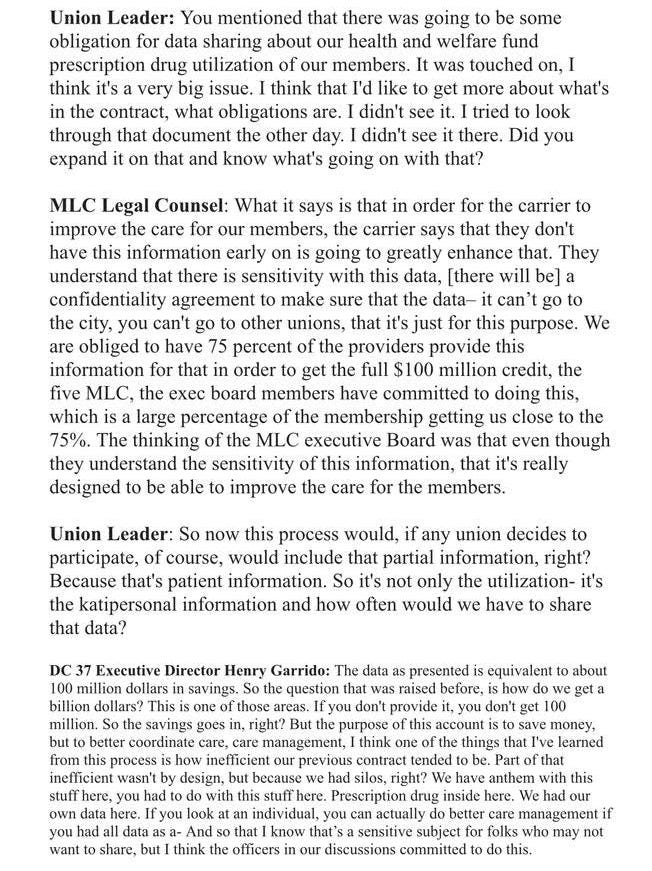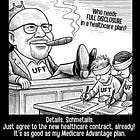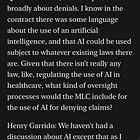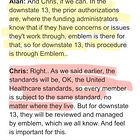The $100 Million Secret: How The Deal to Hand Over UFT Members’ Prescription Data Could Fuel UHC’s Denials
Delegates must reject the NYCEPPO plan, if our prescription data is being used against us. Show us the contract if it’s as good as promised.Show us the AI safeguards and processes for claims & denials

At the September 10th Municipal Labor Committee (MLC) meeting, another revealing exchange took place. A union leader pressed MLC counsel on a hidden detail in the new NYCEPPO plan: a clause requiring unions to hand over members’ Welfare Fund prescription drug data to Emblem and UnitedHealthcare (UHC).
Why would a health insurance giant demand this? And how exactly does it “save $100 million”? The answers raise concerns..
The Exchange that Exposed the Truth
Union Leader: “You mentioned that there was going to be some obligation for data sharing about our health and welfare fund prescription drug utilization of our members… I didn’t see it in the contract. What’s really going on?”
MLC Counsel: “The carrier says that not having this information limits their ability to ‘improve care.’ We’ll sign a confidentiality agreement so it can’t go to the city or other unions. But to get the full $100 million savings credit, 75% of providers must give this data.”
Henry Garrido, DC37: “The data as presented is equivalent to about $100 million in savings. This is one of those areas where if you don’t provide it, you don’t get the $100 million. The purpose is to save money and ‘coordinate care.’ Yes, it’s sensitive, but officers are committed to doing this.”
On its face, this sounds like harmless “data sharing.” In reality, it’s the foundation for something far more dangerous. Even so, the MLC executive board and officers, which includes the UFT’s Michael Mulgrew, have already committed to doing this.
The response from MLC counsel and DC37’s Henry Garrido was telling: without this data, there’s no $100 million in “savings.” With it, UHC gets what it wants — the keys to our members’ most sensitive health information.
What you need to know is that this isn’t just about better “care coordination.” It’s about giving UHC the fuel it needs to run the same AI-driven cost-cutting machine already under fire in federal courts and Senate investigations.
1. Why UHC Wants Prescription Data from New NYCEPPO Members
When new members enter a plan, industry carriers, like UHC, don’t just want to know their names and doctors — it covets their full pharmacy history to deny coverage.
Industry research confirms it. As far back as 2008, BusinessWeek exposed how insurance companies were digging through applicants’ drug histories to deny them coverage. The only difference today is that instead of human underwriters, Big Healthcare wants AI algorithms to do the job — and our union’s prescription data could become the fuel for those denials.
A 2024 study on AI in Pharmacy and Claims Management explains how insurers can now feed pharmacy and claims data into machine learning systems to “check for medical necessity, forecast future trends, and optimize reimbursement schedules.”
On paper, it sounds efficient. In reality, it means AI models like UHC’s controversial nH Predict can potentially flag patients for denials before treatment even begins — by cross-referencing prescription histories with cost algorithms.
Ultimately, this data can prove extremely valuable to UHC. Why?
Because:
Medication use is a proxy for health conditions - Even without a medical diagnosis code, the drugs someone takes can reveal whether they have diabetes, heart disease, cancer, MS, asthma, or depression.
Predicting future costs - Prescription patterns allow insurers to forecast which members are likely to require expensive treatments, hospitalizations, or rehab in the coming year.
Network steering & formulary management - With the data, UHC can push members toward cheaper generic drugs or preferred brands, restrict access to certain costly procedures or treatments, or require “step therapy” (fail cheaper drugs/treatments first)
Feed the AI algorithms - This data can serve as fuel for UHC’s notorious nH Predict system, the very algorithm at the center of lawsuits for wrongful denials of care.
In short: prescription data is a roadmap to both risk and cost containment.
2. How This Data Saves UHC Money
Once UHC has detailed pharmacy histories, they can:
Tighten preauthorizations - If a member’s prescriptions indicate a high-cost condition (like multiple sclerosis), UHC can flag them for stricter preauthorization hurdles before approving new treatments.
Restrict treatment access - They can deny coverage for expensive treatments unless members prove failure on cheaper alternatives — even when the doctor prescribes otherwise.
Predict downstream care costs - Someone on blood thinners may soon need cardiac procedures; someone on biologics may need infusion centers. The AI uses these signals to anticipate (and potentially restrict) costly services before they occur. Also, a patient’s adherence to a drug regimen, or lack thereof, can be a predictor of potential risks.
Adjust premiums, reimbursements, copays & reserves - Pharmacy claims feed into actuarial models that set pricing for the plan. Even in a “self-funded” model like NYCEPPO, UHC manages the risk pool and has a financial incentive to squeeze costs.
3. Links to UHC’s AI Algorithms
The lawsuits and Senate investigations into AI models, UHC’s nH Predict algorithm, show exactly how pharmacy data connects to AI:
Inputs to prediction models - AI systems like nH Predict can combine diagnosis codes, provider notes, and prescription data to predict how long a patient “should” need rehab or hospital care.
Shorter treatment windows - Example: If the AI sees you’re on a drug for Parkinson’s, it might project you’ll recover slower — and cap rehab days earlier, regardless of physician judgment.
Flagging “noncompliance” or “overutilization.” - AI can cross-check prescriptions with medical visits. If the system thinks you’re taking too many meds, or an “off-label” drug, it can deny coverage as “not medically necessary.”
Denial justification - Pharmacy data allows UHC to write denials that sound “evidence-based,” even when they conflict with a doctor’s treatment plan.
How “$100 Million in Savings” = Deny. Deny. Deny.
MLC leadership insists the data will be used for “better care coordination.” But UHC has shown its hand in court:
In a 2023 class-action lawsuit, UHC was accused of using prescription and medical data to deny post-acute rehab, even when doctors insisted it was necessary. UHC denies that final determinations are made by its algorithms but are used only as a “guide” for staff to help inform providers and families about a patient’s potential needs. The litigation is still in the courts.
Senate investigators found denial rates for skilled nursing skyrocketed after UHC’s NaviHealth took over, powered by its AI models.
Families like the estate of Gene Lokken were left bankrupt after UHC’s algorithm allegedly cut off rehab based on predictions—not medical judgment.
So where does the $100 million come from? Likely, from denying care. Every denied day in rehab, every denied expensive treatment or procedure, every patient forced into a cheaper option equals “savings” for the plan.
It’s not $100 million in efficiency. It’s $100 million less in care delivered to our members.
The False Promise of “Care Coordination”
At the September 10th meeting, counsel tried to frame this as breaking down “silos” and enabling better care. Garrido even claimed, “You can actually do better care management if you had all the data.”
But let’s be blunt: UnitedHealthcare is not in the business of care. It’s in the business of denial.
Every lawsuit, every whistleblower case, and every federal probe says the same thing: UHC and other industry giants weaponize data to limit access and cut costs. The NYCEPPO deal hands them an even sharper weapon — a full map of our members’ health risks through their prescriptions.
The Bottom Line
The MLC has committed to hitting a 75% prescription data-sharing threshold to unlock the $100 million “credit.” In doing so, they are gambling with our privacy, our dignity, and our care.
This isn’t savings. It’s a deal with the devil. The $100 million comes out of our members’ denied treatments, restricted drugs, and shortened rehab stays.
UnitedHealthcare seemingly wants our prescription histories not to heal us — but to feed their algorithms and sharpen their knives.
In summary:
UHC can use prescription data to profile members’ health conditions, flag “high cost” patients”, forecast costs, and enforce restrictions.
This use of data would save money by enabling tighter utilization management, denials, and early intervention to cut off expensive care.
This type of data mining is directly tied to AI algorithms like nH Predict, which can use prescription histories as a core input for predicting length of stay, likelihood of complications, and “appropriate” treatment limits.
Delegates must reject the NYCEPPO plan, if our prescription data is being used against us.
Union leadership: Show us the contract if it’s as good as promised. Show us the AI provisions, claims pre-authorization and denial processes and our data safeguards.
Because once UHC and AI has our data, there’s no taking it back.
If we don’t see the assurances beforehand, the City and MLC union bosses will claim “cost savings” while members will pay in pain, stress, and out-of-pocket costs.






Does the contract contain the 75 percent health data threshold requirement?
To be clear, the reference to the 5 MLC executive Board unions referred to in this post's memo is the UFT, DC37, Sanitation Local 831, CWA Local 1180 and Teamsters Local 237.